|
|
|
Sort Order |
|
|
|
Items / Page
|
|
|
|
|
|
|
| Srl | Item |
| 1 |
ID:
086914
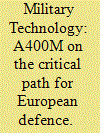

|
|
|
|
|
| Publication |
2009.
|
| Summary/Abstract |
On 10 February 2009, the French Senate unveiled a detailed report of the A400M programme,prepared on behalf of its Finance, Foreign Affairs and Defence Committees by Senators Jeanpierre Masseret and Jacques Gautier.
|
|
|
|
|
|
|
|
|
|
|
|
|
|
|
|
| 2 |
ID:
176530
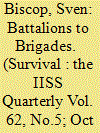

|
|
|
|
|
| Summary/Abstract |
Enhancing the employability of Europe’s armies turns on the creation of permanent multinational force packages, with national brigades serving as the building blocks.
|
|
|
|
|
|
|
|
|
|
|
|
|
|
|
|
| 3 |
ID:
154955
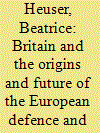

|
|
|
|
|
| Summary/Abstract |
Throughout the second half of the twentieth century, the UK played a key role in the creation and development of a flexible and sustainable mechanism for European defence and security. Beatrice Heuser reviews the history of this engagement, and argues that changes in the UK’s institutional relationship with European partners should not be allowed to undermine the overarching principles of defence cooperation.
|
|
|
|
|
|
|
|
|
|
|
|
|
|
|
|
| 4 |
ID:
160084
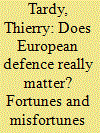

|
|
|
|
|
| Summary/Abstract |
This article examines how the defence component of the Common Security and Defence Policy (CSDP) has been revisited over the last few years. It argues that while the CSDP has grown predominantly as a security – rather than defence – policy, the latest developments that include the creation of a military headquarter, the launching of a Permanent Structured Cooperation (PESCO) and the new role for the European Commission in defence funding, attest to an evolution towards a more central EU defence policy. In the meantime, the article points to some structural impediments to the materialisation of European defence. The momentum says little about the form and finality of military operations that EU states will have to conduct so as to give a meaning to defence in a European context. Moreover, persisting divergences in the EU member states’ respective strategic cultures and institutional preferences – notably vis-à-vis NATO – are likely to continue to constrain European defence self-assertion.
|
|
|
|
|
|
|
|
|
|
|
|
|
|
|
|
| 5 |
ID:
160085
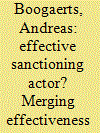

|
|
|
|
|
| Summary/Abstract |
EU sanctions invoked in response to the Iranian nuclear crisis (2006–2016) were long considered to be of limited effectiveness in halting Iran’s nuclear ambitions. Recently, however, sanctions seem to have contributed to a breakthrough in the negotiations over Iran’s nuclear programme. This article aims at explaining this evolution. It, therefore, designs a framework that explains why sanctions (fail to) change targets’ behaviour. Since the sanctions effectiveness literature lacks an integrated framework to explain evolutions in effective coercion, this article merges sanctions effectiveness variables and Bretherton and Vogler’s actorness criteria. Applying the resulting framework to two broad episodes of the Iranian case (2006–2013 and 2013–2016), this article provides a first test of the framework’s added value. It concludes that a full understanding of sanctions effectiveness requires consideration of external, internal, and in-between factors.
|
|
|
|
|
|
|
|
|
|
|
|
|
|
|
|
| 6 |
ID:
154469
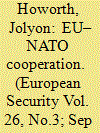

|
|
|
|
|
| Summary/Abstract |
The re-launch of the EU’s security and defence project in the wake of Brexit and the election of Donald Trump has focused the spotlight on the relationship between NATO and the EU. This article reviews the detailed aspects of that relationship as studied in the various contributions to this special issue. It argues that, over and above cooperation on the ground, the key issue to be addressed, which is usually skated over in the “big picture” literature on this question, is: where is all this heading? Is there a move towards a clear EU–NATO division of labour (if so, will it be geographic or functional?); or are the allies seeking a radical new balance of responsibilities and commitment as between the US and the Europeans for the stabilisation of the European neighbourhood? The paper argues that EU “strategic autonomy”, as called for in the Global Strategy document of 2016, can only be achieved through the Europeanisation of NATO itself.
|
|
|
|
|
|
|
|
|
|
|
|
|
|
|
|
| 7 |
ID:
181640


|
|
|
|
|
| Summary/Abstract |
European Defence is in a new and formative phase in which the European Union’s long list of defence acronyms has steadily grown. One of the most noticeable new policy initiatives is the European Commission’s European Defence Fund (EDF). This article consequently investigates and outlines the establishment of the European Defence Fund and the European Commission’s new role within the field of security and defence through the lens of revised neofunctionalism. This article thus asks how and through what steps did the EDF come about; and secondly how can neofunctionalism explain the dynamics involved in the establishment of the European Defence Fund. The analysis uses a process-tracing method and draws on interviews with relevant policymakers and officials in Brussels as well as official EU documents. The conclusions argue that the ever-increasing involvement of the European Commission in a policy field close to national sovereignty is starting to blur the traditional dichotomy between intergovernmental and supranational decision-making. In this way, this study contributes to the growing literature on the weakening of intergovernmentalism within the EU security and defence policy field.
|
|
|
|
|
|
|
|
|
|
|
|
|
|
|
|
| 8 |
ID:
160146
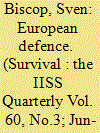

|
|
|
|
|
| Summary/Abstract |
Several projects for European Union defence cooperation have been proposed before, and none has ever really been implemented. The latest attempt feels different.
|
|
|
|
|
|
|
|
|
|
|
|
|
|
|
|
| 9 |
ID:
141671
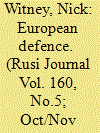

|
|
|
|
|
| Summary/Abstract |
Many have written off the EU's Common Security and Defence Policy as a lost cause. Nick Witney, on the contrary, argues that the UK should fully engage with European efforts and lead its EU partners in finding an effective policy to meet their collective defence and security needs.
|
|
|
|
|
|
|
|
|
|
|
|
|
|
|
|
| 10 |
ID:
187302


|
|
|
|
|
| Summary/Abstract |
European strategic autonomy has become a common motto since the EU’s Global Security Strategy (2016). France and Germany have for several years been playing a leading role in promoting the concept even though they share quite different views on what such autonomy should aim for, especially in a context of multipolarity and power re-configurations. This article analyzes the role of French-German input in European strategic autonomy relying on two criteria: input legitimacy (procedures) and output legitimacy (efficiency). Based on three concrete examples (the MPCC, PESCO, and the European Strategic Compact), the article explores the French-German input in developing European autonomous military tools and capabilities and seeks to explain the legitimacy of this input based on factors such as the historical legacy of French-German military cooperation and the use of political symbolism. Then the article focuses on the question of the efficiency (output) of this bilateral input in European strategic autonomy. The main advantage of this approach is its explanatory power to capture the hiatus between the strong output legitimacy that Paris and Berlin bring into European strategic autonomy and its rather limited empirical output produced. This hiatus can be explained by strategic cultural divergences between Paris and Berlin.
|
|
|
|
|
|
|
|
|
|
|
|
|
|
|
|
| 11 |
ID:
144742
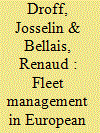

|
|
|
|
|
| Summary/Abstract |
The article focuses on both economics and spatial issues related to Maintenance Repair and Overhaul (MRO) of defence platforms in Europe. Using facts and figures related to costs, trends and fleet sizes evolution, the authors discuss the interest of a spatial reorganisation of MRO production. Given the fiscal situation of the main European countries with a modern army, the relevant scale to consider the reorganisation is certainly Europe. Through the example of defence helicopters fleets of a selection of European countries, the authors address the question of cooperation of the MRO. A greater cooperation in the support of fleets would lead to a spatial reorganisation of MRO. On one side economies can be expected from this reorganisation, but, on the other hand, new problems arise. Specifically, a number of costs associated with different forms of “distances” – geographical, operational and political distances – limit the potential savings that could be expected. This work provides insights on these important issues for the construction of a European defence, both in its political, military and industrial dimensions.
|
|
|
|
|
|
|
|
|
|
|
|
|
|
|
|
| 12 |
ID:
174572


|
|
|
|
|
| Summary/Abstract |
Despite a growing “momentum” on European Union (EU) security and defence, there are no academic analyses that aim to systematically assess the role of the High Representative of the Union for Foreign Affairs and Security Policy and Vice President of the European Commission (HR/VP) in these strategic domains. This is surprising given that the HR/VP is one of the central actors in the complex institutional architecture of EU security and defence. To fill this gap in the scholarly literature and to contribute to a more fine-grained analysis of the two post-Lisbon Treaty HR/VPs, the article assesses Ashton and Mogherini’s mandates in these fields. This study is particularly relevant because the HR/VP’s hybrid institutional role may represent a unique analytical angle to investigate a formally intergovernmental sector, strongly shaped also by EU institutions’ authority over defence-industrial policy. Following these considerations, the article looks at how the two HR/VPs managed to navigate both the military and the defence-industrial dimensions of EU security and defence.
|
|
|
|
|
|
|
|
|
|
|
|
|
|
|
|
| 13 |
ID:
131629
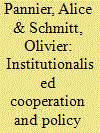

|
|
|
|
|
| Publication |
2014.
|
| Summary/Abstract |
What are the prospects for trilateral concord among Britain, France and Germany in terms of defence policies? Would more institutionalised links among them lead to more convergence of their defence policies? To answer these interrogations, this article investigates the relation between policy convergence and institutionalised cooperation, in particular by studying whether and when one is a prerequisite to the other. First, this article examines the extent to which these countries' defence policies have converged since the end of the cold war based on several indicators: their attitudes towards international forums, their defence budgets, the structure of their armed forces and their willingness to use force. Second, we study each of the bilateral relations between the three states to qualitatively analyse their degree of institutionalisation and the convergence of their defence policies. This article concludes that contrary to the arguments of many discussions, think-tank reports and political actors, there is no evidence that institutionalised cooperation leads to policy convergence as far as defence is concerned.
|
|
|
|
|
|
|
|
|
|
|
|
|
|
|
|
| 14 |
ID:
166746


|
|
|
|
|
| Summary/Abstract |
EU defence policy has been extremely popular over the past three decades, averaging around 75% public support. In fact, no other policy domain is as popular and robust as the idea of pooling national sovereignty over defence. However, public support for EU defence has been dismissed as mere “permissive consensus”, rather than genuine support. Scholars have often assumed that public opinion towards European integration is passive and shallow, especially over foreign policy issues, where the public has limited understanding of the complexity of issues. Consistent with contemporary findings about the complexity of comparative foreign policy attitudes, the authors contest the permissive consensus logic and demonstrate that European publics have held coherent preferences over the use of force at the European level. The authors conclude that the slow progress of integration in this area is due to the reluctance of elites rather than to the reticence of Europe’s citizens.
|
|
|
|
|
|
|
|
|
|
|
|
|
|
|
|
| 15 |
ID:
172422


|
|
|
|
|
| Summary/Abstract |
Time constitutes social life and time management is central to the everyday conduct of international politics. For some reason, however, the practice turn in International Relations (IR) has produced knowledge about how past practices constitute international politics but not about how the future is also a constitutive feature in and on social life. Introducing a novel perspective on practice and temporality, the article argues that intersubjectively situated representations of the future by practitioners in international politics contribute substantially to our understanding of political processes and the making of international politics. To develop what appears a contradiction in terms – that ‘future-practices’ are driven by tacit know-how and conscious reflection simultaneously – the article develops the concept of doxic futures: representations of the future rooted in practical knowledge and tacit assumptions about the self-evident nature of the social world. The argument is illustrated with a case study of European security and defence diplomacy after the UK voted to leave the EU. Through the envisioning of two concrete doxic futures, a ‘Europe of buying together’ and the UK as a third country in EU defence, diplomats effectively tried to save European security and defence cooperation from the potentially disintegrating effects of Brexit.
|
|
|
|
|
|
|
|
|
|
|
|
|
|
|
|
| 16 |
ID:
083239


|
|
|
|
|
| Publication |
2008.
|
| Summary/Abstract |
The move towards a common European defence policy raises a multitude of multidimensional and complex issues. As pointed out in a recent paper (Hartley, 2003), these issues include economic aspects ranging from the role of the European defence industrial base to the costs of a common defence policy, and therefore the issue of burden sharing. This paper, assuming that the provision of common European defence to the participating members has the characteristics of a pure public good, approaches the burden sharing issue raised by Hartley (2003) by calculating a simple benefit share index that is then compared with the contribution made by each country to the costs of the common defence. Assuming the existence of a European Defence Union, the results indicate that some members are under-contributing while others are over-contributing in relation to the benefits derived.
|
|
|
|
|
|
|
|
|
|
|
|
|
|
|
|
| 17 |
ID:
155694


|
|
|
|
|
| Summary/Abstract |
While many have noted that EU member states have different preferences over the prospect of an integrated EU defence, analyses that specifically explore state–industry relations in the definition of EU defence-industrial issues, and in the evolution of the Common Security and Defence Policy in general, are lacking. This is surprising, given that different configurations of government–industry relations have represented a persistent impediment to European defence-industrial cross-border collaboration. This article investigates how state–defence industry relations impact on member states’ preferences towards the EU defence-industrial framework. Based on the case studies of the interaction of France and the UK with the European Defence Agency, this analysis focuses on the difference between public and private defence firms’ governance settings as the crucial explanatory variable accounting for diverging member states’ preferences in this domain.
|
|
|
|
|
|
|
|
|
|
|
|
|
|
|
|
| 18 |
ID:
192607


|
|
|
|
|
| Summary/Abstract |
This article retraces and reconstructs the process of developing and launching the European Union’s Military Mobility project. Situated in the agenda-setting and policy-transfer literature, this article explicates the establishment and implementation of the Military Mobility project and helps to explain the entire policy and development process around the Military Mobility initiative to date. By drawing on process tracing, this article methodologically unpacks the process surrounding this policy development at the EU level. The results show that the European Commission has expanded its competences within the defence field by purposefully and politically acting upon the worsened security situation in and around Europe, while actively building coalitions and managing good working relations with the actors involved in the project. Moreover, the findings show that the EU services have learned from NATO in the defence domain. Thus, this analysis contributes to a greater understanding of the new role of the European Commission in the field of EU security and defence policy.
|
|
|
|
|
|
|
|
|
|
|
|
|
|
|
|
| 19 |
ID:
110299
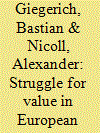

|
|
|
|
|
| Publication |
2012.
|
| Summary/Abstract |
After decades of trying, Europe still does not get the best value out of the substantial amounts it spends on defence. The experience of the past 20 years suggests that European countries will continue to need to deploy forces in a wide range of operations for a wide range of tasks. Yet defence spending is in a decline that is unlikely to be reversed unless there is a major strategic shock. These two facts suggest that Europe's armed forces will be increasingly squeezed and forced to look for new solutions. They have been under pressure for some time to deliver more effective capabilities with smaller resources, but cuts in spending necessitated by budgetary austerity suggest that these pressures could become acute. European countries can still have strong, and more effective, militaries, but to do so they must make better use of their financial resources.
It is not a matter of falling in with the desperate demand of former US Secretary of Defense Robert Gates, who in 2011 joined the long line of US officials calling for a stronger effort from Europe. It is up to European countries, not the United States, to determine themselves what capabilities they need to deal with the threats they perceive. The present security situation offers plenty of uncertainties, such as those created by the Arab Awakening in Europe's neighbourhood, but no new direct and existential threats to the security of European countries. The diffuse nature of threats in an uncertain world has contributed to a general vagueness about the purpose of maintaining armed forces: defence-policy documents developed since the Balkan conflicts have tended to be laundry lists of potentially dangerous issues with little attempt to prioritise.
|
|
|
|
|
|
|
|
|
|
|
|
|
|
|
|
| 20 |
ID:
123881
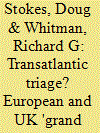

|
|
|
|
|
| Publication |
2013.
|
| Summary/Abstract |
Transition in the Middle East, the ongoing effects of the global financial crisis and the United States' rebalance to Asia are key trends that will have an impact on transatlantic relations and European defence. As US priorities shift, a common European 'grand strategy' could encourage the development of a shared vision to help Europe order its priorities and begin to respond to the new, post-austerity context of world politics and shrinking defence budgets.
Will these changes be enough to quicken Europe's currently shrivelled strategic thinking? In any scenario, given its relative weight and role as an interlocutor with the US, the United Kingdom will remain vital to any developing European security and strategy agenda, although its broader relations with the European Union will complicate this relationship. How it proceeds will also help to define the boundaries of this nascent European security order.
This article charts these key global trends, relates them to current debates in European security and strategy and maps opportunities and constraints faced by Europe and the UK in developing a grand strategy in an increasingly 'American-lite' European neighbourhood.
|
|
|
|
|
|
|
|
|
|
|
|
|
|
|
|
|
|
|
|
|